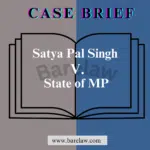
Table of Contents
Computation of Detention Period under Section 167 of CrPC
Computation of Detention Period under Section 167 of CrPC
The case of State of Madhya Pradesh v. Rustum has brought to the forefront a crucial aspect of criminal jurisprudence in India – the computation of the detention period under Section 167 of the Criminal Procedure Code (CrPC). This provision plays a pivotal role in safeguarding the rights of the accused, ensuring a fair trial, and preventing illegal detention. In this article, we will delve into the intricacies of computing the 60/90-day period stipulated in Section 167 of the CrPC, examining the implications of the Rustum case and its broader implications in the criminal justice system.
Understanding Section 167 of CrPC
Section 167 of the CrPC deals with the procedure to be followed when an accused is arrested and detained during the course of an investigation. It lays down the specific time limits within which the accused must be brought before a magistrate. The relevant portions of this section are as follows:
- Detention Period for Investigation: If a person is arrested and detained for the purpose of an investigation, they must be produced before a magistrate within 24 hours of arrest, excluding the time necessary for the journey to the magistrate’s court.
- Extension of Detention: The magistrate can authorize the detention of the accused for a total period of 15 days if the investigation cannot be completed within the initial 24 hours.
- Judicial Control: Subsequent extensions may be granted by the magistrate, but the total period of detention should not exceed 60 days in cases triable by a magistrate, or 90 days in cases triable by a sessions court.
The Rustum Case: Significance and Implications
The case of State of Madhya Pradesh v. Rustum brought into question the correct method of computing the 60/90-day period mentioned in Section 167 of the CrPC. The key issue at hand was whether the day on which the accused is arrested should be included while calculating the detention period. The Supreme Court, in its judgment, held that the day of arrest should be included when calculating the 60/90-day period.
This decision has significant implications for the criminal justice system, as it narrows the window of time available for the police to complete their investigation before filing charges. It reinforces the principle that the right to a speedy trial is a fundamental right enshrined in the Indian Constitution and must be upheld.
Impact on the Accused
The Rustum case decision, which includes the day of arrest in the calculation of the detention period, has both positive and negative implications for the accused:
Positive Implications:
- Speedy Trial: Including the day of arrest in the calculation ensures a speedier resolution of cases, preventing unnecessary delays in the investigative process.
- Protection from Prolonged Detention: The decision safeguards the accused from being held in detention for extended periods without charges being filed or without a fair trial.
Negative Implications:
- Shorter Investigative Period: Law enforcement agencies may find it challenging to complete thorough investigations within the shorter 60/90-day timeframe, potentially affecting the quality of investigations.
- Increased Pressure: The decision places added pressure on the police and investigative agencies to expedite their work, which may lead to rushed investigations or potential lapses in due process.
Legal Precedents and Interpretations
The Rustum case aligns with the broader jurisprudential trend of interpreting Section 167 of the CrPC in favor of the accused and the right to a speedy trial. Various courts have consistently upheld the importance of adhering to the prescribed time limits and have interpreted the section strictly to prevent any abuse of power by the authorities.
However, it is essential to note that the interpretation of Section 167, particularly regarding the computation of the detention period, has evolved over the years through legal precedents. The Rustum case is the latest in a series of judgments that have clarified this issue and brought greater clarity to the legal landscape.
Balancing Speed and Due Process
The Rustum case decision has rekindled the debate about the delicate balance between expediting criminal trials and ensuring that due process and thorough investigations are not compromised. While a speedy trial is a fundamental right, it should not come at the expense of justice.
To strike this balance effectively, several measures can be adopted:
- Efficient Investigations: Law enforcement agencies should strive for efficiency and professionalism in their investigations, ensuring that cases are built on strong evidence.
- Use of Technology: The use of modern technology and forensic tools can expedite investigations without compromising their quality.
- Judicial Oversight: Magistrates and judges should exercise diligent oversight to prevent any abuse of the detention provisions while ensuring that investigations are conducted properly.
- Legal Reforms: Continuous legal reforms and amendments should be considered to harmonize the need for a speedy trial with the requirement for comprehensive investigations.
Conclusion
The Rustum case, with its implications on the computation of the detention period under Section 167 of the CrPC, underscores the importance of a robust criminal justice system that respects the rights of the accused while ensuring that justice is delivered swiftly. The decision aligns with the broader jurisprudential trend of prioritizing the right to a speedy trial and safeguards against prolonged detention.
However, it also presents challenges for law enforcement agencies to conduct thorough investigations within the prescribed time limits. Striking the right balance between speed and due process is essential to maintain the integrity of the criminal justice system. In doing so, India can continue to uphold the principles of justice and fairness while respecting the rights of both the accused and the state.



